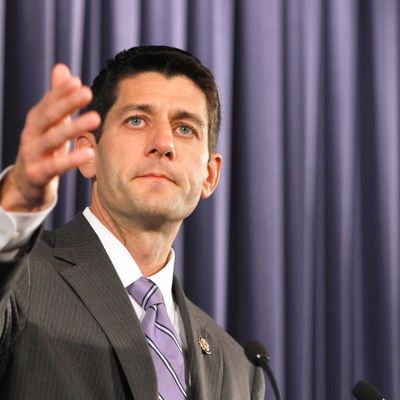
James Capretta, writing at National Review, lays out what looks like the emerging Republican strategy on the debt ceiling. Rather than take up President Obama’s offer to cut Social Security and Medicare in return for higher revenue through tax reform, Republicans should refuse to increase another penny of revenue, period:
A better course for the year ahead begins with the realization that the party’s top priority is to resist at all costs any further tax increases. That’s far more important than, during the debt-limit debate, drawing lines in the sand that will quite predictably be crossed. The president got his tax hike on the rich in the fiscal-cliff deal. The GOP must make it absolutely clear that that’s it. No more tax hikes. Period.
Naturally, insisting on zero new revenue will make a deal to reduce the long-term deficit impossible. Don’t worry — Capretta has an answer for that, too:
It is possible that the deal that was struck last week will be the last major piece of budgetary legislation passed during the Obama era. It’s hard to see serious tax reform advancing at this point, and certainly the kind of entitlement reforms that are commensurate with the size of the problem won’t be enacted. If that is indeed the case, then history will not look kindly on the Obama presidency. Future generations of Americans will live less prosperously because of the massive debt and deficits of these years. And President Obama will rightly shoulder most of the blame for this colossal failure of leadership.
So, step one: Block any compromise to reduce the deficit. Step two: Blame Obama for failing to reduce the deficit. I actually think this plan can work.
This may sound like a cynical strategy. And it is. But it’s not a purely cynical strategy. It reflects an important intellectual development on the right. Capretta is advocating not just the classic no-taxes-ever approach that has defined the party for years, but also its newer (or newly fervent) belief in privatizing health-care services.
The main driver here is Paul Ryan, whom Capretta advises. (Yuval Levin, another Ryan favorite, makes a similar, though less openly cynical, no-deal argument for the Weekly Standard.) Ryan has accepted the argument, traditionally pushed by Democrats, that the main driver of long-term budget deficits is not the aging population but skyrocketing health-care costs. Ryan has decided that the only possible answer to the problem is to turn Medicare into a system of subsidized private insurance, and that the wonders of competition between insurance firms will dramatically suppress cost inflation (“the way it always works when the consumer is in charge,” he says).
As a corollary to this position, Ryan utterly and fervently rejects the reforms put in place by Obama in the Affordable Care Act, which amounted to a comprehensive overhaul of Medicare designed to incentivize doctors, hospitals, and insurers to pay for better outcomes and not just more expensive procedures. Ryan has insisted that these reforms must fail because they involve bureaucracy and only markets can work. This is despite the fact that every other advanced economy on Earth has both a more regulated health-care system and dramatically lower per capita health-care costs. It is also despite the fact that health-care costs have dramatically slowed their growth in recent years, a trend suggesting at least the possibility that the pay-for-value revolution can work and that the budget projections assuming endlessly, skyrocketing health-care-cost inflation (and thus skyrocketing deficits) will prove far too pessimistic.
It is impossible to find anybody on the right who will even entertain the possibility. (David Brooks yesterday wrote yet another column assuming that medical inflation will continue forever and that Democrats have no plan to curtail it.) Ryan has elevated confidence in his voucherized method and total disdain for the possibility that Obama’s might work into a total metaphysical certainty within his party.
Viewed in this light, the GOP’s refusal to strike a deal makes sense. What is the point of cutting retirement benefits, if their One True Solution to long-term deficits is not tried? Why agree to a plan that would appear to reduce the deficit, and may even do so for a while, and thus take away the party’s ability to campaign against runaway deficits in 2016, and elect, say, Paul Ryan, and implement its plan?






























